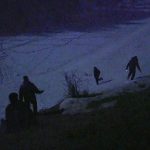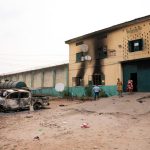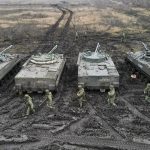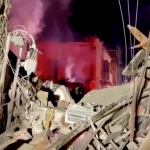Flies swarm around the mouths and faces of little children, women in burkas huddle in the dust sheltering from the sun praying for food to be donated; homes lost, their possessions now a small clutch of bags.
As the fighting in Afghanistan rages, people flee the battlefields that were once cities. In their tens of thousands, many cross borders to neighbouring countries looking for sanctuary.
I actually wrote these words 20 years ago, but I am witnessing it all once again, today.
Please use Chrome browser for a more accessible video player
In Shahrenow Park in central Kabul, where they can find space, they huddle in family groups.
Every day more and more people arrive here, carrying whatever possessions they could gather before fleeing the fighting that is once again raging across Afghanistan.
This is fast turning into a major humanitarian crisis.
The numbers of displaced people grow by the day, even the hour.
I have been travelling in and out of Afghanistan since the fateful attack on the Twin Towers in New York in September 2001, events that are of course simply known as 9/11.
Countless embeds with the British and American forces, five separate clandestine meetings with the Taliban, and hundreds of hours chronicling the fate of the Afghan people followed over the next two decades.
My last visit, about seven years ago, was to cover the election of the current president, Ashraf Ghani, who promised his people a new era of governance and a move towards lasting peace and prosperity.
Those dreams appear to be shattered now – I was more than sceptical then.
Now, driving through the streets of Kabul, clogged up with traffic because so many of the main routes are closed and barricaded for fear of suicide attacks, I can’t help but be amazed that the trillions of dollars spent, the thousands of lives lost, the sheer scale of the international presence in this poor landlocked country appears to have come to nought.
The government and the army haven’t fallen yet, but on the current trajectory, it really is when not if.
The lightning offensive of the Taliban on cities in the north, east, south and west of the country is overwhelming Afghanistan’s army. Even its elite commandos are struggling.
Soldiers who have given up the fight say they were encircled in their camps, and despite requests for help they were abandoned by the government – and rather than die they surrendered.
In some cases, it was left to local police forces to defend their neighbourhoods.
Farida Khurasani’s husband and brother, both police officers, were killed by the Taliban in Kunduz after they were attacked in their police station. She says they were burnt to death.
She escaped with her two children who are now sleeping rough with her in the park. Throwing dirt in the air, she yelled: “Look what we are living in!”
Farida Khurasani, like many of the people we met, are angry at the government and feel abandoned. I asked her if she specifically blamed the Americans for pulling out.
“Yes indeed, when the Americans left our country this disaster started, I’m not blaming Americans but President Ghani, [because] when the Americans left, the destruction of our country started.”
Moazudin Akhunzada arrived with his family from Mazar-i-Sharif a day ago, joining 1,800 families in this park.
In Afghanistan, family groups are mostly calculated at seven people, so here, in this one park, that’s over 12,500 displaced people.
There are many impromptu camps like this across the country and thousands more have already started crossing borders of neighbouring countries seeking refuge.
It’s already miserable here, it will definitely get worse.
“Look at my children’s situation here,” Moazudin Akhunzada told me, pointing at his family huddled together beneath a fence. “It’s almost two days they’ve been sleeping on mats, nobody helps us with water, food or anywhere to sleep.”
These families are relieved to have escaped the fighting for now, but they also know they are not safe.
Every day it seems the Taliban are creeping closer and closer to the capital.
It’s hard to believe that Afghanistan’s troubled history is repeating itself yet again after such a massive intervention by the West.
Two decades later there’s a very real danger we are back to square one. The Taliban seem poised to take over the country, and with it, the dreams of peace, of education for everyone, universal human rights, and life without war, are perilously close to being shattered.






















